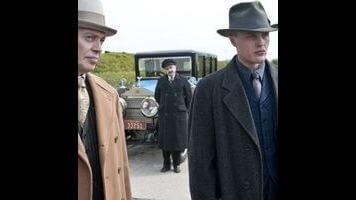Since 2007, TV Club has dissected television episode by episode. Beginning this September, The A.V. Club will also step back to take a wider view in our new TV Reviews section. With pre-air reviews of new shows, returning favorites, and noteworthy finales, TV Reviews doesn’t replace TV Club—as usual, some shows will get the weekly treatment—but it adds a look at a bigger picture.
The great HBO shows have strong thematic through-lines. If Deadwood was about the birth and foundation of the America we know today, then The Sopranos was about its decline and The Wire its death. Six Feet Under was about what it meant to live in that empire, and Game Of Thrones centers on the world that was before, the inadequacy of a monarchy, and the difficulty of finding something better than a bad king.
Boardwalk Empire falls just short of greatness, because it has no strong, central unifying theme. At best, it’s sort of the bridge between Deadwood and The Sopranos—the nascent republic growing into a superpower, seen through the birth of organized crime. Though the show remains entertaining and compelling television, it’s still difficult to explain just what it’s about. That may be because the central character is something of a cipher, or it might be because the show is so sprawling that it ultimately amounts to a collection of scenes and storylines that flirt endlessly with coalescing before spinning off on their own axes. At the show’s worst, it can seem like a series of coin-operated historical dioramas. Pop a quarter in and watch 1920s America come to life. When there is a theme it’s often baldly stated, and the symbolism tends to be overt.
Yet, when Boardwalk Empire is in a groove, there are few shows that can touch it for pure pulp pleasures. The eighth episode of season four, “The Old Ship Of Zion,” concludes with two scenes of such riveting suspense that it’s hard to imagine the season’s final third being anything other than a barnburner. Maybe more than any other show on TV, Boardwalk Empire is interested in delivering satisfaction to viewers. Stories will seem to be marooned on an island of their own for weeks at a time until, like a bolt out of the blue, creator Terence Winter and his writers reveal the hidden structure that’s been propelling the season all along. That novelistic formula could grow tiresome; that it remains satisfying four seasons in is perhaps the show’s signature achievement.
It’s all too easy to damn Boardwalk Empire with faint praise. Even with the greatest amounts of momentum, it still proceeds at a rather stately pace, taking time to luxuriate in individual scenes that sometimes add little to the series but context. Yet, if Boardwalk Empire is one of those coin-operated dioramas, the thing keeping it from being a great TV series is simultaneously the thing that makes it such an enjoyable watch. Put simply, this is a world to get lost in, to watch for an hour every week and imagine oneself there amid the bootleggers and dancers. It thinks nothing of pausing the action for a musical number, or a look at the way things were in 1924. It knows it can keep viewers thanks to some of the best-executed action sequences in TV history.
The show’s fourth season feels, in many ways, like a refinement of its third. It’s borrowing that season’s structure—introduce some villains early on, let the pressure build until it seems ready to crush the principals whole, then let everything shatter in gloriously violent pieces—but in almost every area, it’s improved upon what was already a good template. The villains and new characters are varied and intriguing, particularly Jeffrey Wright as a proponent of something very like black liberation theology, while the stories grow tenser with every week. The series even took a potent page from Winter’s previous work on The Sopranos, introducing a Bureau Of Investigation inquiry into Steve Buscemi’s operations.
In some ways, the series seems most defined by Buscemi’s character. As a former treasurer, he’s a man with a constant plan, someone who works as the still center within the chaos swirling around him. Even when his plans are thwarted, Buscemi plays Enoch “Nucky” Thompson as someone who’s thought through at least six other options and will turn to one of those in due time. It’s the perfect exemplar of the series he stars in: a plan, executed to perfection, with so few of the loose ends and stray idiosyncrasies that set apart the great TV shows from the very good ones. But maybe that’s no matter. Maybe it’s enough to have that one still center on the TV schedule, where audiences can go knowing they’ll be reliably entertained and satisfied, no matter what.
Created by: Terence Winter
Starring: Steve Buscemi, Kelly Macdonald, Michael Shannon, Shea Wigham
Airs: Sundays at 9 p.m. Eastern on HBO
Format: Hour-long prestige drama
Eight episodes of season four watched for review


























![Rob Reiner's son booked for murder amid homicide investigation [Updated]](https://img.pastemagazine.com/wp-content/avuploads/2025/12/15131025/MixCollage-15-Dec-2025-01-10-PM-9121.jpg)














